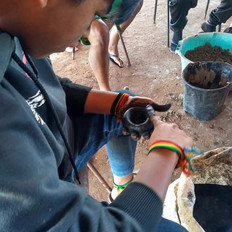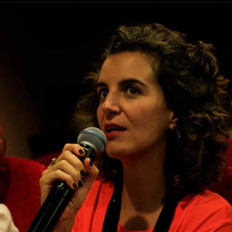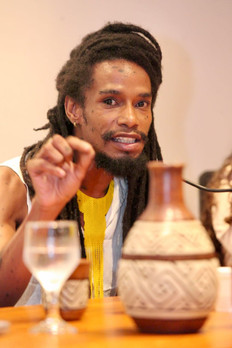
Seminário, Educativo
III Art, Education and Culture Seminar - Indigenous knowledge in circulation
17 to 19 April 2024
The ways of knowing and teaching indigenous people are multiple and are at the center of the constitution of worlds and of encounters between them. The traditional knowledge of a people is like a tree: roots in their traditional territories, trunks of collective existence, and branches that expand their reach and sow seeds for the sprouting of new existences, in exchange with the environment and with all the beings with which they coexist.
This knowledge is dynamic and transformational: it circulates through orality, through actions, through songs, paintings and rituals; it circulates through books, through poetry, through the indigenous presence in universities, in governmental institutions, in forums and international meetings; it circulates through social networks, in audiovisual production, in electronic media. They also assert themselves in art and education experiences and projects promoted in indigenous territories and schools.
The III Seminar on Art, Education and Culture: Indigenous Knowledge in Circulation seeks to hold meetings, dialogues and experiences with indigenous and non-indigenous artists, leaders, researchers, and educators about different modes of production and dissemination of knowledge and their relations with teaching-learning processes, encompassing diverse experiences, inside and outside the villages.
For this meeting, the indigenous guests are from the Tremembé, Kaingang, Kaiowá Guarani, Mbya Guarani, Gvão, Guajajara Tentehar, Baniwa, Mebengokre Kayapó, Tabajara, Kadiwéu and Ka’apor peoples, presenting reflections, actions and aesthetics related to what is usually translated and understood as indigenous education. Ways of doing, constructing, singing, caring, healing, embellishing are presented, among the various modes of knowledge circulation. Memory and intergenerational encounters thus constitute one of the main axes of programming.
Paola Gibram and Rafael Pacheco
Curators
Schedule
17/4
10:00 – Open conversation Existences, traditional territories and indigenous education.
Raquel Tremembé, Gilda Kuitá Kaingang and Izaque João. Articulation: Paola
Gibram
Indigenous education constitutes a fundamental part of the struggles of indigenous peoples and is directly connected with the rights to territory, to health, and to their own ways of existing. This panel brings together perspectives and trajectories of leaders who work in research and education of the Tremembé (MA), Kaingang (PR) and Kaiowá (MS) peoples, addressing common themes and specificities related to each context, based on indigenous experiences in the Amazon, the Pantanal and
the Atlantic Forest.
14:00 – Oficina Saberes Tremembé: medicinal herbs, for learning and teaching, between generations
Maria Lúcia Aguiar Tremembé, Sônia Maria Araújo Tremembé, Maria José Dias Tremembé
Elderly women from the village of Engenho da Terra Indígena Tremembé (MA) share traditional knowledge about plants and ways of producing teas and medicines. The memory and circulation of this knowledge are fundamental to collective existence, they are a living form of their knowledge, which continues to be strengthened even with the constant attacks on the territorial and educational rights
of this people.
19:00 – Screening of the films Nn Ga Vī: a resumption of Kanhgág in motion and Ga Vī: the voice of the clay
followed by a debate with directors Nyg Kuitá Kaingang and Gilda Kuitá Kaingang
Ga v: the voice of the clay
Synopsis: The animation Ga v was created through the memories narrated by Gilda Wankyly Kuitá and Iracema Gãh Té Nascimento, with images and sounds captured in the Apucaraninha Indigenous Land (PR), of the Kaingang people, during the meeting of women “Ga vī: the voice of the clay, talking to the earth”, in 2021. The short film addresses the tradition of ceramics, clay, territory and ancestry. Winner of the Best Screenplay Award at the 1st Indigenous Film Festival (FECI) in 2022
.
Production and direction: COMIN-FLD, Coletivo Nn Ga, Tela Indígena
Direction and screenplay: Ana Letícia Meira Schweig, Angélica Domingos, Cleber Kronun de Almeida, Eduardo Santos Schaan, Georgia de Macedo Garcia, Gilda Wankyly Kuita, Iracema Gãh Té Nascimento, Kassiane Schwingel, Marcus A. S. Wittmann, Nyg Kuitá, Vini Albernaz
Nn Ga v — a moving kanhgág resumption
Synopsis: This documentary presents reflections and performances by members of the youth collective Kaingang Nn Ga, from the Apucaraninha Indigenous Territory, located in the north of the state of Paraná, in the southern region of Brazil. The Kaingang voices — kanhgág v — are presented through the speeches of some of the members and people connected to the collective, as well as through songs, considered one of the main ways in which they presentify their ancestors [Yahweh] and bring their jagré [spirit guides] close to them. The film shows the strong connection of the Nn Ga movement with the indigenous school, exploring the ways in which contemporary Kaingang reflect on the cultural and existential usurpations resulting from the many years of contact with the phog [white, non-indigenous] and the urgent need to resume the Kanhgág practices and knowledge that were forbidden or violated – who consider that they were “sleeping” and are now being
“woken up”.
Direction: Nyg Kuitá Kaingang and Paola Gibram
Realization: OJIK Nn Ga — Kaingang Nn Ga Indigenous Youth Organization
20:15 – Open Talk Resumed by the Kanhgág Jykre – memories, trajectories, and transformations in Kaingang indigenous education
Janaína Kuitá and Jaciane Goj Fieles Kuitá
“The school took what belongs to us and it is also through the school that we are going to take what is ours back” – said Mrs. Gilda Kuitá, referring to the impositions and prohibitions imposed on Kaingang knowledge (kanhgág Jykré) in the first moments of schooling in the Kaingang territories, during the activities of the SPI. With the post-tutorship period, indigenous teachers and leaders began to rethink Kaingang school education, incorporating the calendar of festivals and rituals, traditional knowledge, and the practice of singing and dancing, with the formation of indigenous youth groups. This panel brings together Kaingang educators who have been thinking about the challenges of these transformative processes and about how to make the school a territory of political and cultural empowerment for
the Kaingang people.
18/4
9 a.m. – Knowledge Workshop of the Hawaiian people: plants, crafts, songs and stories.
Irene Gavião, Vladilson Bandeira Gavião and Lídia Gavião
Among the Gavião people (MA), the knowledge that populates the world takes various forms, in which certain plant species are central – they act as medicines, raw materials for works of art and in a medicinal form. They are characters from historical narratives. The workshop offers an immersion in Hawaiian culture with artisans and leaders from the Monte Alegre village,
in the Governador Indigenous Territory.
16:00 – Open Talk Indigenous Literatures: Paths
With Edson Kayapó, Auritha Tabajara, Olívio Jekupe. Presentation and debate: Idjahure
Kadiwel
Writers and directors share reflections on the paths still to be taken by indigenous literatures, and the intricacies of the editorial production of “native” books, art curation, and other creative processes and encounters between cultures.
19:00 – Conference The Living School of the Baniwa People in Rio Negro.
Francy Baniwa. Presentation and debate: Rafael Pacheco
Living Schools are indigenous projects that seek to strengthen the circulation of traditional knowledge. The Viva Baniwa School was born from the work carried out over six years of researching and writing the book Umbigo do Mundo, written by Francy Baniwa, based on the traditional narratives transmitted by her father, Francisco Luiz Fontes Baniwa. At this conference, Francy Baniwa shares experiences from the Viva Baniwa School, reflecting on the worldview of
her people.
19/4
09:00 – Workshop on the Art of Songs and the Circulation of Knowledge by the Guajajara Tentehar people.
With Cintia Guajajara, Davi Guajajara and Elza Guajajara. Articulation: Magda Pucci.
Indigenous songs are living forms of knowledge. They act on bodies, strengthen collective bonds, link the present to the past, and sing the future. At this meeting, educators from the Guajajara Tentehar people from the Araribóia Indigenous Land share educational experiences centered on traditional songs and their connections with other knowledge and
activities of this indigenous people.
16:00 – Open Talk Teko Arandu: indigenous education beyond school.
With Kerexu Mirim, Izaque João. Articulation: Ana Paula Gonçalves
The Guarani people’s universe of knowledge went beyond disciplinary knowledge and went beyond the limits of the school. Debate between thinkers from the Mbya Guarani (SP) and Kaiowá Guarani (MS) peoples and researchers explore the trajectory of schooling in the territories, the distinctions between indigenous education and indigenous school education focusing on the experience of youth and strategies to
make schools an instrument of sociocultural strengthening.
19:00 – Closing Celebration: Sing with the Ka’apor people
The Ka’apor people (MA) present their singing tradition. They are songs and shaman songs, inspired by birds, and mostly accompanied by bamboo flute and drums. The Ka’apor singing group takes us through their sound universe, which intertwines verbal arts, ritual performances and shamanic action
.
Curatorship
Paola Gibram

Paola Gibram has a PhD in Social Anthropology from USP (2021), postdoctoral student and collaborating professor of the Postgraduate Program in Anthropology at UFGD. She acts as a consultant for indigenous art projects and as an advisor to groups of the Kaingang indigenous people. She is a researcher at the Center for Amerindian Studies at USP (Cesta/USP). His research addresses indigenous arts, politics, and rights. She also works as a musician, acting as an instrumentalist and composer with various projects in São Paulo.
Rafa Pacheco

Rafa Pacheco is an anthropologist and musician. She works in research, cultural production and consultancy, for indigenous organizations, public agencies and the third sector, on topics such as sociocultural diversity, indigenous rights, socio-environmental rights, transitional justice (rights to memory, truth, and reparation), and education for ethnic-racial relations. Author of articles in scientific journals in Brazil and abroad. He works with the Xetá people (PR) on the implications between memory, aesthetics and politics. PhD student in social anthropology and researcher at the Center for Amerindian Studies, both at USP, advisor to the Guarani Yvyrupa Commission (CGY) and the São Paulo Municipal Department of Education (SME-SP), collaborator of Armazém Memória. Organized the collection Fica na Aldeia, Parente! Indigenous peoples and the Covid-19 pandemic (Primata, 2020), in addition to dossiers in the magazine Campos (UFPR) and thematic seminars at the CPF – Research and Training Center Sesc-SP.